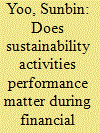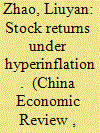|
|
|
Sort Order |
|
|
|
Items / Page
|
|
|
|
|
|
|
| Srl | Item |
| 1 |
ID:
177828


|
|
|
|
|
| Summary/Abstract |
This study explores the impact of geopolitical events on the stock return behavior of inter-Korean economic cooperation-related firms depending on the North Korean regime. We document empirical evidence showing that cross-sectional stock return tends to react positively to positive geopolitical events under the current regime in North Korea (Kim Jong-un), whereas negative geopolitical events have limited impact. Conversely, we find that negative geopolitical events yielded more pronounced effects on the stock returns of related firms under the former regime (Kim Jong-il). In addition, this study investigates the role of geopolitical shock in the evolution of aggregate economic variables of South Korea using Caldara and Iacoviello’s (2018) geopolitical risk index. Geopolitical shock is found to yield no statistically meaningful impact on stock price index, industrial output, employment, or gross trade volume. Furthermore, aggregate stock market variables are found to be immune to geopolitical shock in South Korea. These results indicate that market participants estimate the escalation of geopolitical risk into full-scale war as unlikely.
|
|
|
|
|
|
|
|
|
|
|
|
|
|
|
|
| 2 |
ID:
180151


|
|
|
|
|
| Summary/Abstract |
As a market for sustainability investing is growing rapidly, understanding the impact of environmental, social, and governance (ESG) activities on firms’ financial performance is becoming increasingly important. In this study, we examine the effect of ESG performance on stock returns and volatility during the financial crisis resulting from the coronavirus (COVID-19) pandemic. To quantify the impact, we use company-level daily ESG score data and United Nations Global Compact (GC) score data. In our dataset, ESG scores indicate ESG performance that is deemed important to financial materiality, and the GC score indicates the firm reputation for following UN rules. Our results indicate that during the pandemic, an increase in the ESG score, especially the E score component, is related to higher returns and lower volatility. Conversely, increasing GC scores is correlated with lower stock returns and higher volatility. In addition, we find that firms in lower return groups benefit more than other firms. Focusing on energy sector impacts, we show that although the non-energy sector benefits more than the energy sector from increasing E scores, energy sector firms can still reduce their stock price volatility by increasing these scores. Our study offers significant implications for ESG investment strategies during financial crises.
|
|
|
|
|
|
|
|
|
|
|
|
|
|
|
|
| 3 |
ID:
122459


|
|
|
|
|
| Publication |
2013.
|
| Summary/Abstract |
The basic objective of this article is to evaluate the pricing implications of market-wide investor sentiment risk for cross-sectional return variations of Indian listed companies across industry groups. A multivariate time-series regression approach has been used to examine the impact of sentiment risk on stock return behaviour in the presence of other market-wide systematic risk factors. Our results suggest that the role of sentiment risk in the determination of a cross-section of stock returns is not uniform across the test asset portfolios formed on the basis of size, book-to-market equity, liquidity and momentum characteristics. For all portfolios, the impact of sentiment risk on the cross-section of stock returns behaviour has been disproportionately negative. The effect holds even after controlling for systematic market-wide risk factors. Although the impact of sentiment risk on industry-shorted portfolio returns persists in accordance with the theoretical argument, the cross-sectional variation with respect to different industries has been heavily dependent on the availability of stocks in that particular industry. The commonality of the sentiment effect across industry is not similar, as it is for the aggregate market. The results suggest that generalisation of the hard-to-value and difficult-to-arbitrage argument must be judged with caution, keeping the industry effects in mind.
|
|
|
|
|
|
|
|
|
|
|
|
|
|
|
|
| 4 |
ID:
156464


|
|
|
|
|
| Summary/Abstract |
This paper presents new evidence for the Fisher hypothesis, which states a positive relationship between nominal stock returns and inflation. We introduce a new data set from the episode of hyperinflation that occurred in China after World War II. To establish the reliability of our estimates we consider different frequencies, and time horizons and econometric models. The results reveal that stocks were a complete hedge against expected inflation and a partial hedge against unexpected inflation. In contrast to the empirical literature on the ‘stock return-inflation puzzle’, we find that the Fisher hypothesis is applicable to common stocks even with a short-horizon in the Chinese hyperinflation context.
|
|
|
|
|
|
|
|
|
|
|
|
|
|
|
|
|
|
|
|
|